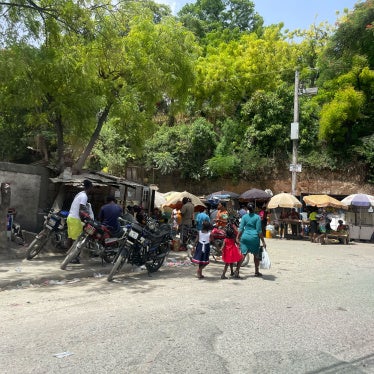"I realized I had become pregnant. I was worried -- how would I continue to work? How would my children eat? Go to school?" Beatriz told me last month when I sat down with her in Medellin, Colombia. Beatriz is a widow and the mother of five children. She did not plan her last child. She was raped -- and had no access to information about preventing unwanted pregnancy or emergency contraception. She wasn't able to go see a doctor when it happened. When it was clear she was pregnant -- her first thought was about the economic safety and security of her family.
As she told me about her family's struggle to survive since she became pregnant almost 3 years ago, it was clear: Beatriz understands perfectly that her access to reproductive health care is intimately tied to the economic well-being of her household. Unfortunately, this simple truth is something that some world leaders gathering in Rio this week seem to have trouble grasping.
Policymakers from around the world come together this week to shape a global plan for a sustainable future at Rio +20, the United Nations Conference on Sustainable Development -- culminating in a political document on how to reduce poverty, advance social equity and ensure environmental protection in the context of an ever-growing global population.
Last week, Human Rights Watch and Amnesty International added to the chorus of civil society organizations and UN agencies that have toiled for months to ensure that language regarding human rights, equity, and protections for indigenous and other vulnerable groups remain in what is known as the outcome document. Human Rights Watch and Amnesty International jointly affirmed that "realizing human rights and achieving sustainable development are inter-dependent and mutually-reinforcing goals," and called on states to ensure that the document reaffirms the international human rights framework.
General human rights language in the outcome document appears to be safe at this point in the negotiation, but fierce debate continues over the language on reproductive rights for women and girls. As has happened at past global gatherings, valuable time has been spent arguing against including language that seeks to promote healthy family planning and safe sex, healthy pregnancy, healthy babies and healthy families. Behind this charge is the Holy See and ally countries not known for their support of women's rights. Catholics for Choice last week published a briefing paper raising concerns that the Holy See's approach undermines women's rights.
It's hard to understand why language on reproductive health and rights could cause such problems at a conference dedicated to seeking solutions for the earth's currently unsustainable development. A growing body of research confirms what common sense has told us for years- reproductive health fosters investment in human capital. Recognition of reproductive rights protects women's and girls' access to quality services and information -- both of which can lead to better overall health for these women and girls and for their children. And this starts an important economic development ball rolling -- better health outcomes for children create stronger incentives to invest in education -- both a mother's and a child's. Better education can lead to better economic opportunity and production outcomes. And the cycle continues.
I have interviewed hundreds of women and girls in Latin America and the Caribbean like Beatriz about their access to family planning and other reproductive health services. They know intuitively that if their right to reproductive health was respected and fulfilled, their families would be physically and economically better off. When I think about their experiences and the hopes they have conveyed to me for their own families' futures, I find the debate in Rio even more baffling -- what could possibly be better for the world's future than ensuring that women who choose to become mothers have healthy pregnancies and bear healthy babies when their families are ready and strong enough to support them?
Some decision-makers realize this, too. For now, reason and rights have managed to win out in the Rio+20 document negotiations. Reproductive health and rights language remains next to language on women's access to education and basic services. But, the tough days of the final negotiation are just beginning. At similar global conferences in the past, reproductive rights and health have been the first priority to be sacrificed in the search for consensus. Governments can't let women like Beatriz down once again.
Beatriz and women like her know the importance of reproductive rights to the future we all want. It's time for the world's governments to collectively recognize it too.









